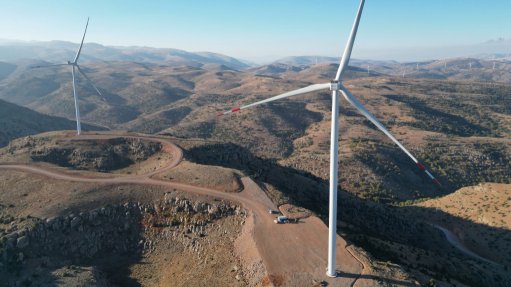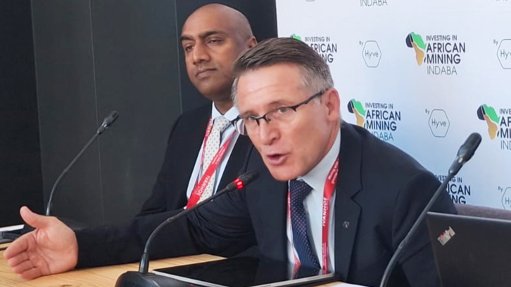New African export
I was in mourning as I penned this piece – it was only hours after my beloved Bafana Bafana’s 2-0 defeat by football nonentity Rwanda in a qualifier for the 2026 World Cup tournament, to be hosted by Canada, Mexico and the US. Coach Hugo Broos mumbled something about the state of the pitch when explaining the lacklustre showing away, but most of the Rwanda players ply their trade in decent leagues on the continent and beyond and must have found the pitch equally impeding.
Unless there is a drastic turnaround in its performance in the remaining qualifiers, the team won’t be a participant at Canada/Mexico/US 2026. Its last appearance at the world’s most prestigious football extravaganza by dint of qualification – as opposed to participating as the host – was in 2002. South Africans’ most enduring memories of that tournament – in South Korea and Japan – are not about the exploits of the team, which bombed out in the group stages. Many will remember the rather peculiar composition of coach Jomo Sono’s technical team, which had within its ranks people who were said to be in charge of ‘special projects’. In reality, these were juju-men, or sangomas, as we call them in this part of the world, and their role was supposedly to use their special powers to enhance the team’s performance.
Back to the fateful encounter in the town of Butare, in southern Rwanda, about one-and-a-half weeks ago. With Rwanda being thousands of kilometres from South Africa, only a handful of spectators rooted for Bafana Bafana as they slugged it out against their hosts on the artificial-surfaced pitch that was waterlogged following a thunderstorm before kick-off.
It turned out some of those egging on the South African team were Zimbabwean teachers who have been in Rwanda since October last year as part of a government-to- government scheme aimed at plugging a serious shortage of teachers in the East African country. That Rwanda would turn to Zimbabwe is understandable – despite his failings, the late President Robert Mugabe ensured the country’s education system, especially science and mathematics education, remained decent. A whole university and a couple of teacher training colleges are dedicated solely to producing specialist educators in these crucial subjects.
This is not the first time an African government has resorted to exporting its skilled citizens as unemployment worsens. In July 2020, when the world was in the throes of the Covid-19 pandemic, the Ghanaian government cut a deal with Barbados in terms of which it exported more than 100 nurses to the eastern Caribbean island nation for a renewable two years, the same duration as for the Zimbabwe-Rwanda arrangement.
Now Kenyan President William Ruto has set his sights on similar deals for his skilled, jobless compatriots, but this time with European nations. He told congregants at a church service in Nairobi, the Kenyan capital, on the eve of a trip to Germany late last month: “The German Chancellor was in Kenya a few months ago and tonight I am flying to Germany because he promised employment opportunities for 200 000 Kenyans, and I have to organise for that. We also have agreements with the French President and other leaders from all over the world.
“Together with [Kenyan Labour Cabinet Secretary Florence] Bore, we are signing bilateral labour agreements to export Kenyan labour. Every week, we want an export of about 3 000 to 5 000 people to provide labour all over the world so that they can bring us money to transform this country.”
Remittances from Africans in the diaspora generate tidy sums of money for the sending countries, with the World Bank estimating that 2022 inflows totalled $647-billion.
I hope the governments that sign the labour export deals don’t demand a large chunk of what their citizens earn in foreign countries. I wouldn’t put doing such a thing beneath the Zimbabwe government, considering how cash-strapped it is, partly because of the sort of corruption exposed by Qatari television station Al Jazeera last year. Being away from home comes with its own difficulties and the ‘exports’ must receive much of, if not all, the money they earn.
Article Enquiry
Email Article
Save Article
Feedback
To advertise email advertising@creamermedia.co.za or click here
Comments
Announcements
What's On
Subscribe to improve your user experience...
Option 1 (equivalent of R125 a month):
Receive a weekly copy of Creamer Media's Engineering News & Mining Weekly magazine
(print copy for those in South Africa and e-magazine for those outside of South Africa)
Receive daily email newsletters
Access to full search results
Access archive of magazine back copies
Access to Projects in Progress
Access to ONE Research Report of your choice in PDF format
Option 2 (equivalent of R375 a month):
All benefits from Option 1
PLUS
Access to Creamer Media's Research Channel Africa for ALL Research Reports, in PDF format, on various industrial and mining sectors
including Electricity; Water; Energy Transition; Hydrogen; Roads, Rail and Ports; Coal; Gold; Platinum; Battery Metals; etc.
Already a subscriber?
Forgotten your password?
Receive weekly copy of Creamer Media's Engineering News & Mining Weekly magazine (print copy for those in South Africa and e-magazine for those outside of South Africa)
➕
Recieve daily email newsletters
➕
Access to full search results
➕
Access archive of magazine back copies
➕
Access to Projects in Progress
➕
Access to ONE Research Report of your choice in PDF format
RESEARCH CHANNEL AFRICA
R4500 (equivalent of R375 a month)
SUBSCRIBEAll benefits from Option 1
➕
Access to Creamer Media's Research Channel Africa for ALL Research Reports on various industrial and mining sectors, in PDF format, including on:
Electricity
➕
Water
➕
Energy Transition
➕
Hydrogen
➕
Roads, Rail and Ports
➕
Coal
➕
Gold
➕
Platinum
➕
Battery Metals
➕
etc.
Receive all benefits from Option 1 or Option 2 delivered to numerous people at your company
➕
Multiple User names and Passwords for simultaneous log-ins
➕
Intranet integration access to all in your organisation


















